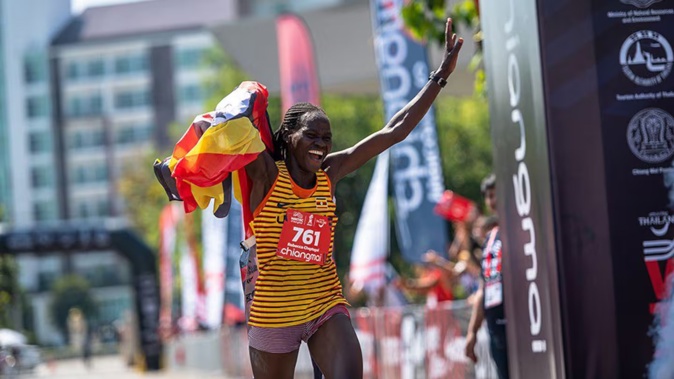
WARNING: This story deals with family violence and may be distressing.
Ugandan Olympic marathon runner Rebecca Cheptegei has died, hospital officials said today, days after she was doused in petrol and set on fire by her boyfriend.
Kenyan and Ugandan media reported that Cheptegei, 33, who competed in the Paris Olympics, suffered burns to more than 75% of her body in the attack in Kenya on Sunday, making her the third female athlete to be killed in the country since October 2021.
“We have learnt of the sad passing on of our Olympic athlete Rebecca Cheptegei ... following a vicious attack by her boyfriend,” Donald Rukare, president of Uganda Olympics Committee, said in a post on X.
“May her gentle soul rest in peace and we strongly condemn violence against women. This was a cowardly and senseless act that has led to the loss of a great athlete.”
Cheptegei, who finished 44th in Paris, was admitted to a hospital in the Kenyan Rift Valley city of Eldoret after the attack.
Cheptegei “passed today morning at 5.30am after her organs failed”, Owen Menach, senior director of clinical services at Moi Teaching and Referral Hospital, told Reuters, adding that a full report regarding the circumstances of her death would soon be released.
Peter Ogwang, Uganda’s minister of state for sports, described her death as “tragic”.
“Kenyan authorities are investigating the circumstances under which she died and a more detailed report and programme will be provided in due course,” he said.
Cheptegei’s death shines a spotlight on violence experienced by sportswomen in Kenya, where she lived when she trained.
In October 2021, Olympian runner Agnes Tirop, a rising star in Kenya’s highly competitive athletics scene, was found dead in her home in the town of Iten, with multiple stab wounds to the neck.
Ibrahim Rotich, her husband, was charged with her murder and has pleaded not guilty. The case is ongoing.
The 25-year-old’s killing shocked Kenya, with current and former athletes setting up “Tirop’s Angels” in 2022 to combat domestic violence.
Joan Chelimo, one of the founders of the non-profit, told Reuters that female athletes were at high risk of exploitation and violence at the hands of men drawn to their money.
“They get into these traps of predators who pose in their lives as lovers,” she said.
FAMILY VIOLENCE
How to get help:
If you're in danger now:
• Phone the police on 111 or ask neighbours or friends to ring for you.
• Run outside and head for where there are other people. Scream for help so your neighbours can hear you.
• Take the children with you. Don't stop to get anything else.
• If you are being abused, remember it's not your fault. Violence is never okay.
Where to go for help or more information:
• Women's Refuge: Crisis line - 0800 REFUGE or 0800 733 843 (available 24/7)
• Shine: Helpline - 0508 744 633 (available 24/7)
• It's Not Ok: Family violence information line - 0800 456 450
• Shakti: Specialist services for African, Asian and Middle Eastern women and children.
• Crisis line - 0800 742 584 (available 24/7)
• Ministry of Justice: For information on family violence
• Te Kupenga Whakaoti Mahi Patunga: National Network of Family Violence Services
• White Ribbon: Aiming to eliminate men's violence towards women.
How to hide your visit:
If you are reading this information on the Herald website and you're worried that someone using the same computer will find out what you've been looking at, you can follow the steps at the link here to hide your visit. Each of the websites above also has a section that outlines this process.
Take your Radio, Podcasts and Music with you









